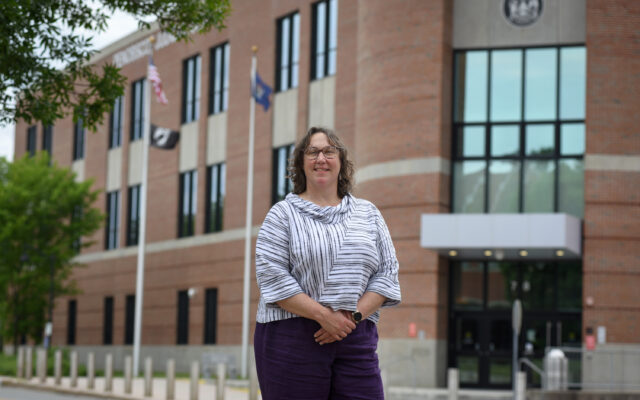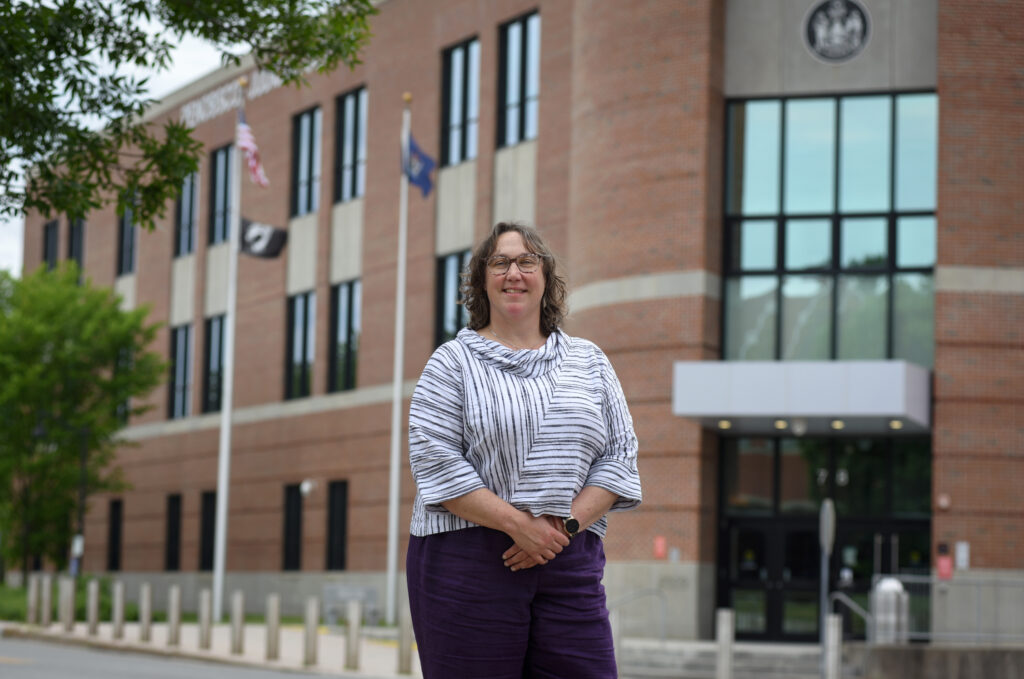
Wait times for public defenders have plummeted
By Marie Weidmayer, Bangor Daily News Staff
The “nerdy” changes within Penobscot County’s criminal justice system are what District Defender Logan Perkins is most proud of during her first year on the job.
Until last year, people arriving at the Penobscot County Judicial Court for their arraignments did not get a copy of the charges against them nor the police report for their case. That made it difficult for employees of the Highlands Region Public Defenders Office, which covers Penobscot and Piscataquis counties, to discuss cases with defendants, Perkins said.
Defendants were entering pleas, sometimes guilty pleas, without knowing the evidence against them. If someone pleaded not guilty, those documents would later be mailed or emailed to them. If a person pleaded guilty, the materials were never sent, she said.

DISTRICT DEFENDER — Highlands Region District Defender Logan Perkins outside of the Penobscot Judicial Center in Bangor on July 10.
The public defenders pushed for the Penobscot County District Attorney’s office to provide those paper documents, a change that has helped cases run more smoothly, Perkins said.
Now those documents are included in the case file, which means the lawyers can go over any evidence the prosecutor’s office has with defendants, which helps improve the quality of conversations, Perkins said.
It’s been a year since Perkins started her new role as head of what is now the Highlands Region Public Defenders office. The first assistant defender came on board at the end of July 2024, and the office was fully up and running by January.
During that time, the office has been instrumental in shrinking the number of people in Penobscot County stuck waiting weeks or months for a lawyer. Maine was the last state in the country to create public defender offices, which are designed to provide lawyers to low-income defendants as courts have found Maine is violating peoples’ constitutional rights by failing to provide legal counsel in a timely manner.
The defenders office was not designed to provide a lawyer for every low-income person in the area, but it is taking on at least 30 percent of cases in Penobscot County and some in Piscataquis County.
A year ago, about 300 people were waiting for lawyers in Penobscot County, with some waiting longer than a month, Perkins said. Now roughly 50 cases in the county are without a lawyer but that number can sometimes drop to single digits, she said.
With fewer people needing lawyers, the wait times for those who do has plummeted.
“The reduction in that list is in no small part due to Logan [Perkins] and her people,” said Jim Billings, executive director of the Maine Commission on Public Defense Services. “We’ve got some good people up there and Logan’s doing a great job with them. She’s a very energetic and charismatic leader for them.”
The wait list for lawyers in Penobscot County is shrinking even as felony cases have skyrocketed. In Penobscot County, the number of felony cases is up 130 percent through June 27, compared with the same date in 2019, according to data from the Maine Judicial Information System. Statewide, felony cases have surged by 67 percent.
The criminal justice system is not capable of handling the number of cases in Penobscot County. It’s on the prosecutor and Legislature to use discretion when charging people and creating laws, Perkins said.
The defenders office is purely reactive to what the other parts of the system do, she said.
“Our job is to make sure that people’s individual rights and freedoms are respected and that they have the due process that they’re entitled to,” Perkins said.
The office will have six defense lawyers when it is fully staffed this fall, which is likely the most lawyers in one office ever in Penobscot County. Perkins could only name one private firm in the area that once had four or five.
Lawyers have varying degrees of experience when they come into the office, with some moving from out of state and not yet up to speed on Maine’s laws, Billing said. Those people may need a bit of time before they’re ready to take a full case load but they pick things up quickly because there are experienced colleagues to learn from, he said.
“There’s something to be said for working together in a group of four, five, eight, 10 lawyers all pulling together, doing the same thing with a common purpose and mission,” Billings said. “There’s so much shared camaraderie, cross pollination of ideas, learning from each other — that’s really the best way for new people to learn on actual cases with someone who’s more experienced.”
The defenders office has started taking on a wider range of cases, including complex felony cases, as lawyers gain more experience, Perkins said. That includes aggravated drug trafficking, a common charge that people waiting for lawyers may face.
Having lawyers available to take those cases allows the system to run more efficiently, District Attorney R. Christopher Almy said. Newer lawyers in the office are also gaining experience, which Almy hopes will mean they can take on additional complex cases.
While the defenders office has helped address the lawyer shortage, a $13 million funding gap starting next spring means the commission will not be able to pay lawyers who are not part of defenders offices. If that happens, the number of people waiting for lawyers is likely to skyrocket, leaving more cases than the defenders office can pick up.
Once the Highlands Region office becomes fully staffed, its lawyers will gain experience and make the public defenders office better advocates for its clients, Perkins said.
“I’m really excited and hopeful that we’re going to get a reputation in the community as strong advocates, as the people you want in your corner when something bad happens or when you’ve made a mistake and need to deal with the consequences,” Perkins said.
“That matters a lot that people think of us and think, ‘Oh good, the PD’s office is helping my niece, or my brother or my whoever, I know they’re going to take good care of him.’”